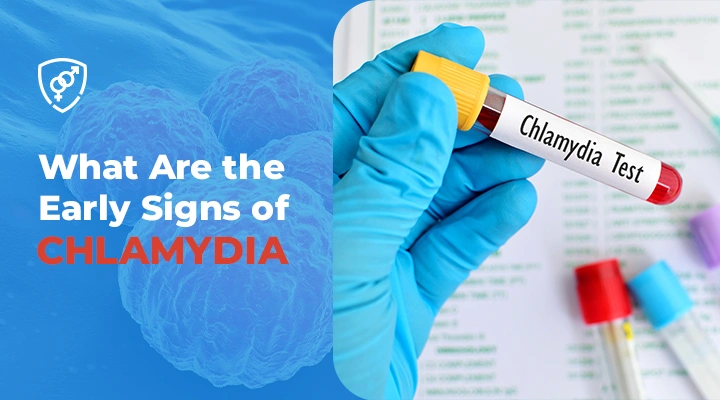Think you might have chlamydia? It’s one of the most common STIs, often silent in the early stages but still highly contagious and capable of causing long-term health issues if left untreated.
Here’s what to watch for and when to get tested.
What Is Chlamydia?
Chlamydia is a common bacterial infection spread through unprotected sex, including vaginal, anal, and oral contact. It affects both men and women, and it can even infect areas like the throat.
While it’s highly treatable, chlamydia often goes unnoticed. That’s because in many cases, early signs of chlamydia are either very mild or completely absent.
Early Signs Of Chlamydia In Men & Women
In Men, Chlamydia Symptoms May Include:
- Burning or pain when urinating
- Unusual penile discharge (white, yellow, or green)
- Swollen or tender testicles
In Women, Chlamydia Symptoms May Include:
- Abnormal vaginal discharge
- Bleeding between periods
- Pelvic pain or pain during sex
These chlamydia symptoms after sex typically appear within 1 to 3 weeks of exposure but not always.
Can You Have Chlamydia Without Symptoms?
Yes, absolutely.
In fact:
- Up to 70% of women
- And around 50% of men may experience no symptoms at all.
This is why many people don’t know they have it until complications occur, such as pelvic inflammatory disease (PID) or infertility.
What Does Chlamydia Feel Like Early On?
When symptoms do appear, early chlamydia can feel like:
- A mild burning sensation during urination
- Discharge that seems unusual or new
- Light spotting or pelvic pressure
In oral cases, chlamydia symptoms in the throat might include:
- Sore throat
- Redness
- Swollen lymph nodes (though these are rare and usually mild)
How To Test For Chlamydia?
Wondering how to test for chlamydia? It’s easier than you think.
You can get:
- A simple urine test
- Or a swab test (especially for throat, rectal, or vaginal exposure)
You can do this at:
- Doctor’s office or clinic (like Manhattan STD Testing)
- Urgent care
- Or even with at-home STD testing kits
If you’ve had unprotected sex, a new partner, or any unusual symptoms, it’s smart to schedule a routine STD screening. For peace of mind, consider our chlamydia testing—quick, private, and accurate.
Comprehensive STD Panel Option
While you’re checking for chlamydia, it’s also wise to consider broader screening, especially if you’ve had unprotected sex or multiple partners. Our comprehensive STD panel checks for a full range of common infections, offering complete peace of mind in one visit.
Final Thoughts
Chlamydia doesn’t always show symptoms, which is why it remains one of the most silently spread STDs. Early signs of chlamydia can be subtle or completely absent, and many individuals may feel perfectly fine despite being infected. The only way to know for sure is through proper testing.
If you’ve had unprotected sex or are experiencing any concerning symptoms, don’t wait—get tested. At Manhattan STD Testing, we offer fast, confidential same-day STD testing with discreet care from board-certified providers and reliable results in just 1–2 days. Chlamydia is treatable with antibiotics, but only if it’s detected early. Don’t risk your health or your partner’s, get tested today.
Frequently Asked Questions
Can chlamydia affect your fertility even if it goes unnoticed?
Yes. Untreated chlamydia can lead to serious complications like pelvic inflammatory disease (PID) in women and epididymitis in men, both of which can cause infertility—even if there were no symptoms beforehand.
Is it possible to get chlamydia again after treatment?
Absolutely. Getting treated once doesn’t make you immune. You can be re-infected if you’re exposed again, especially if your partner hasn’t been treated.
How long should I wait after exposure to get accurate chlamydia test results?
Most tests can detect chlamydia reliably about 1–2 weeks after exposure. Testing too early might lead to false negatives, so follow up with a healthcare provider if you’re unsure.
Can chlamydia be transmitted through oral sex?
Yes. Though less common than genital transmission, chlamydia can be spread through oral sex and may cause a throat infection, even without noticeable symptoms.
Will antibiotics for chlamydia treat other STDs too?
Not always. While azithromycin or doxycycline treats chlamydia, they may not be effective against infections like gonorrhea, syphilis, or trichomoniasis. That’s why a comprehensive STD panel is often recommended.
Disclaimer
This blog is for informational & educational purposes only and does not intend to substitute any professional medical advice or consultation. For any health-related concerns, please consult with your physician, or call 911.

-
About The Author
Dr. Syra Hanif M.D.Board Certified Primary Care Physician
Dr. Syra Hanif is a board-certified Primary Care Physician (PCP) dedicated to providing compassionate, patient-centered healthcare.


